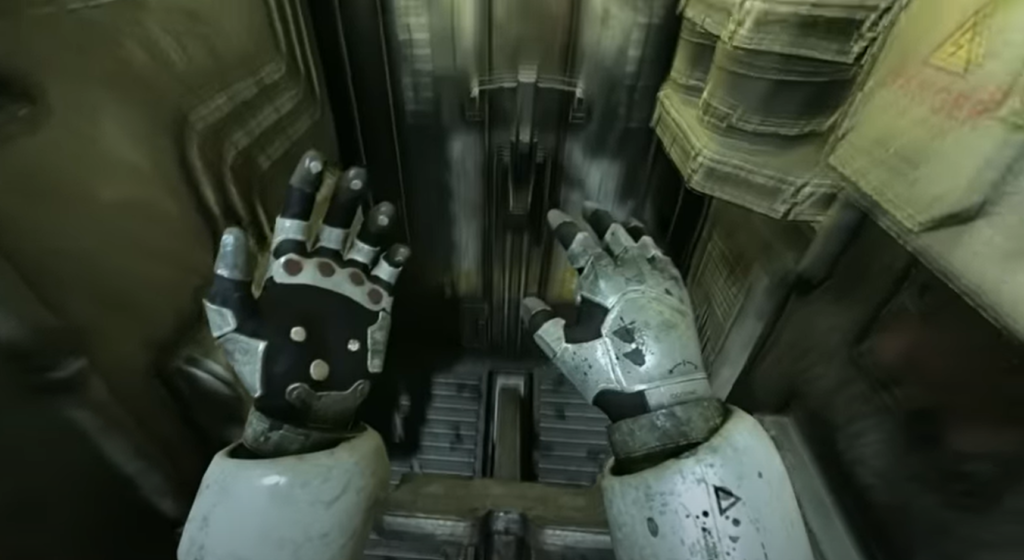During the post-credit scene of SOMA, controlling “Simon” felt so foreign. Going through the survey that was available near the beginning further enhanced the dissociation I felt from the supposed same avatar I had been controlling for the past 9-10 hours. I move like Simon. I talk like Simon. I have the same ol’ human hands as Simon did in the beginning. And yet, he’s nothing like the mechanized Simon with a built-in flashlight that I’ve come to know as “Simon.” But it isn’t the avatar that induces alienation. It is the sequence of scenes that the game places the player into that spurs (dis)continuity of identity.
During the first “transfer” into the deceased researcher’s body and suit where the player (and Simon) is…aware to a degree, we are constantly reminded that our consciousness is not transferred, but rather copied to another location. Right after the copy, our vision filling with static until blurring into white, our perspective changes to that of the dead researcher within the pod, and we admire our new hands.

But we hear a distant voice and a familiar one at that. It’s Simon’s own voice, but othered. External to us, as we/Simon also talk, questioning Catherine of the other Simon’s speech. Who is he? Why is he here? It’s always been Simon and Catherine, not Simon, Catherine, and…other Simon. Other Simon can’t join us on the journey, or even exist…Right? But the dread players feel at the realization is a dread of external sympathy.
Seeing our old body slumped in the chair, recognizing the form we only had one chance to perceive wholly in a random mirror, it’s…foreign. We’ve only ever experienced controlling Simon, so the new body we now inhabit is the only “true” Simon we will know. Certainly, we can sympathize with Simon’s old self, deciding his fate of immediate death or uncertain eternity, but he is not us, and we are not him. We simply move forward after discarding the body with the vague understanding that other Simon has a consciousness of sorts, but it’s not our consciousness.

Then comes the final climax where Simon sits in the piloting chair, simultaneously uploading his and Catherine’s consciousnesses and launching the ARK. With loud noises, vibrations, panicked voices, buffered upload, the player fills with anxiety and anticipation. Will our consciousness successfully upload? Or was our entire journey for naught? But the upload completes, and our vision distorts with static and blurs to white before fading to reveal…the same desolate Launch Dome, now ARK-less.
While Simon fails to grasp the situation (and in turn, getting upset and losing his only companion), I was hit with a consuming dread. The pit in my stomach grew as Simon and Catherine’s fight fills the background before dropping into an eternal sound of silence with Simon’s lone voice echoing the space.
As the credits rolled, there was only one thought in my head. A dread-filled expletive. From our prior experiences of being copied, the player is always brought along with the continuing Simon. Conditioned and pampered with the expectation of being transferred to the copy’s perspective, staying in the original body–the original consciousness–was a harsh confrontation with the reality of the project. Sure, we know that there would be two parallel consciousnesses, but we can only ever experience one. And that bias of experiencing one process rather than the other misplaces a label of “real” and “original.”
So when suddenly dropped laterally back into ARK-Simon after the credits, it was no longer a streamlined continuation of Simon’s Journey. The jarring shift allowed us to step in the other’s shoes while maintaining the feeling of alienation. While we see and physically experience successfully transferring to the ARK, this ARK Simon we’re inhabiting isn’t the real Simon. Sure, Simon made it, but we’re also still down on Earth below the ocean. Alone. We didn’t make it.

 Catherine?
Catherine?And just to leave with a thought, what if the ending and post-credits were swapped? Would we be satisfied after making it onto the ARK even with the “dismissible” knowledge that a copy was left on Earth? Or would the sudden return to our familiar suited hands and desolate environment cheapen and sour our success of reaching the ARK?
Does experiencing someone else’s perspective facilitate true empathy and unify experiences? Or does it strengthen our sense of “self” and further separate the “other”?

